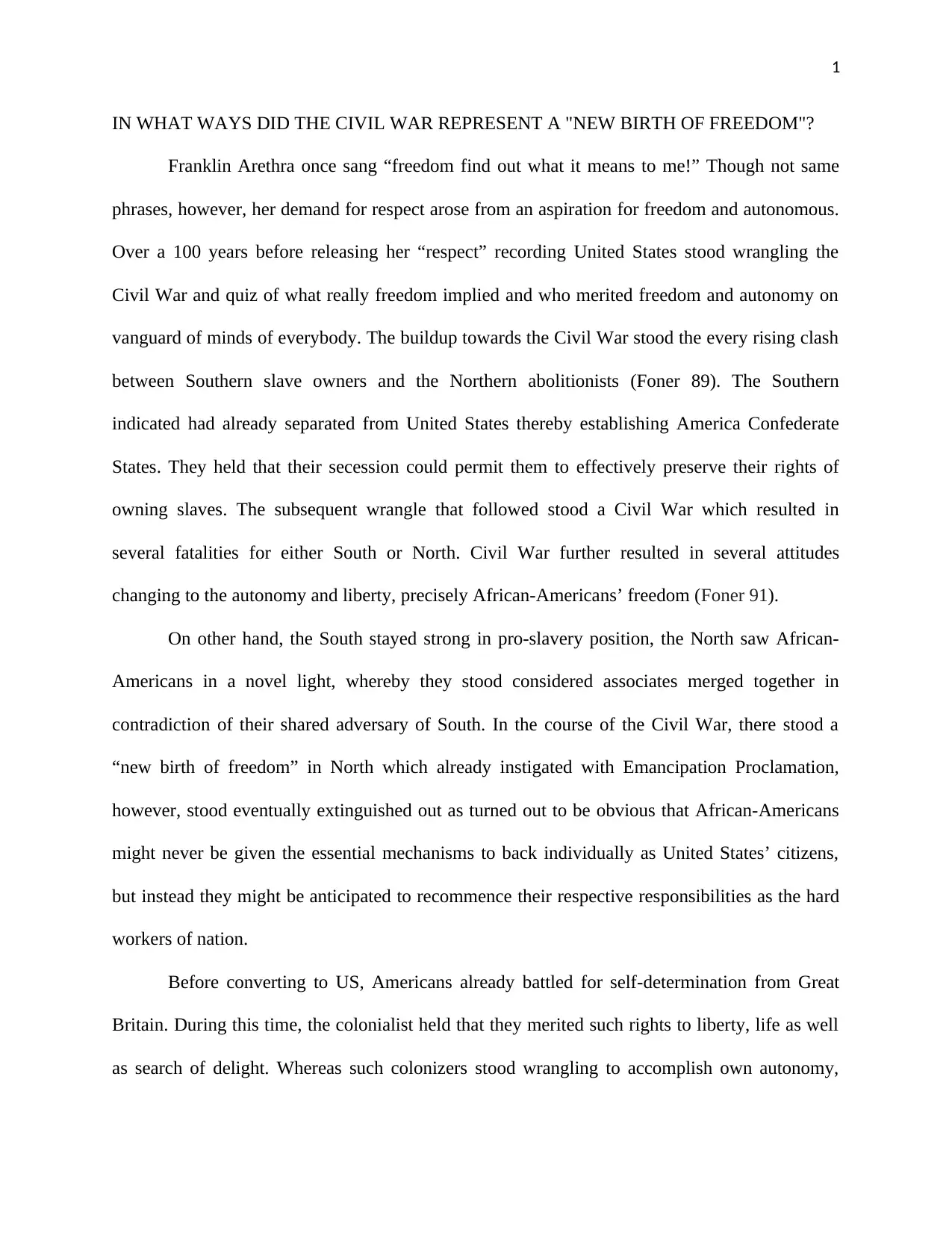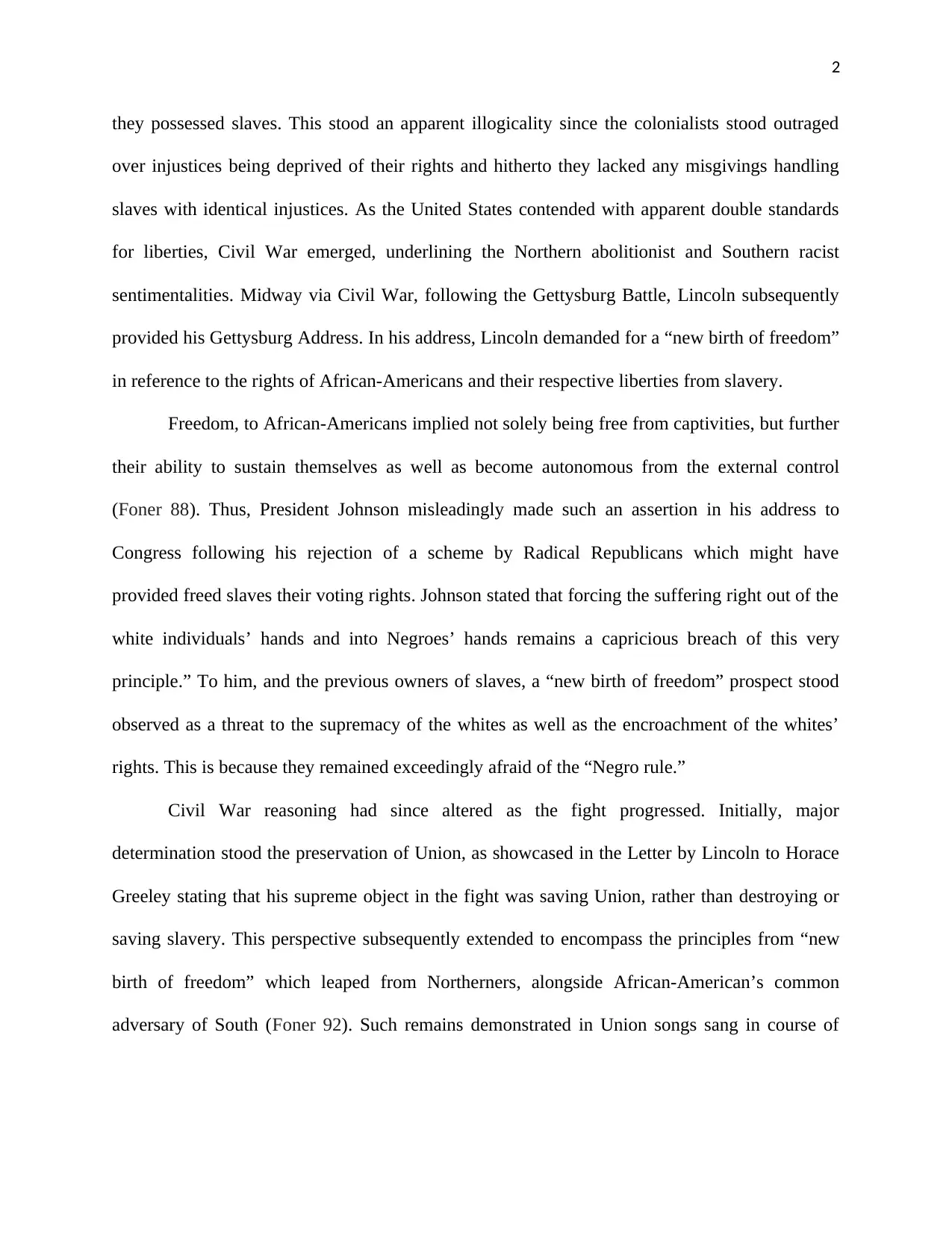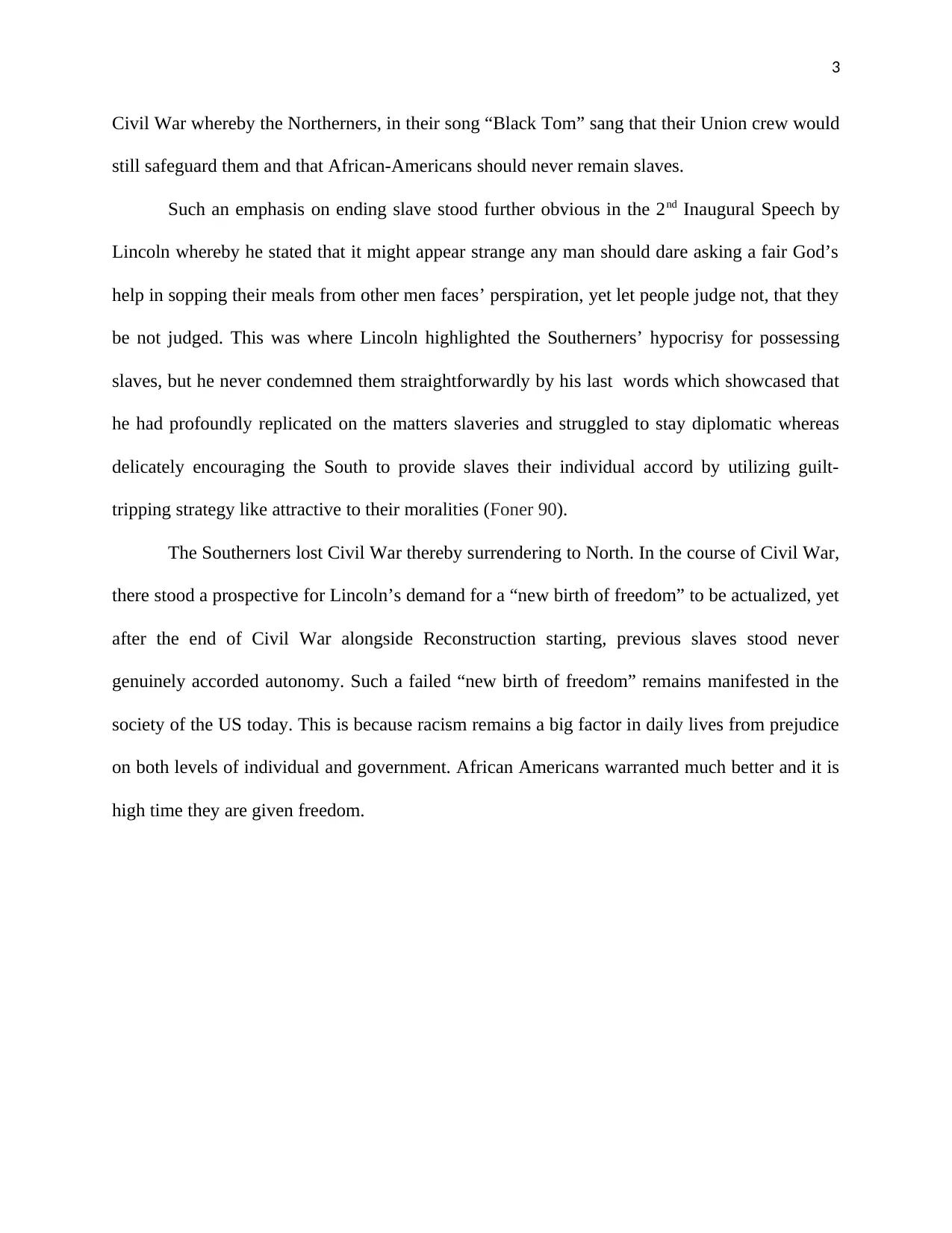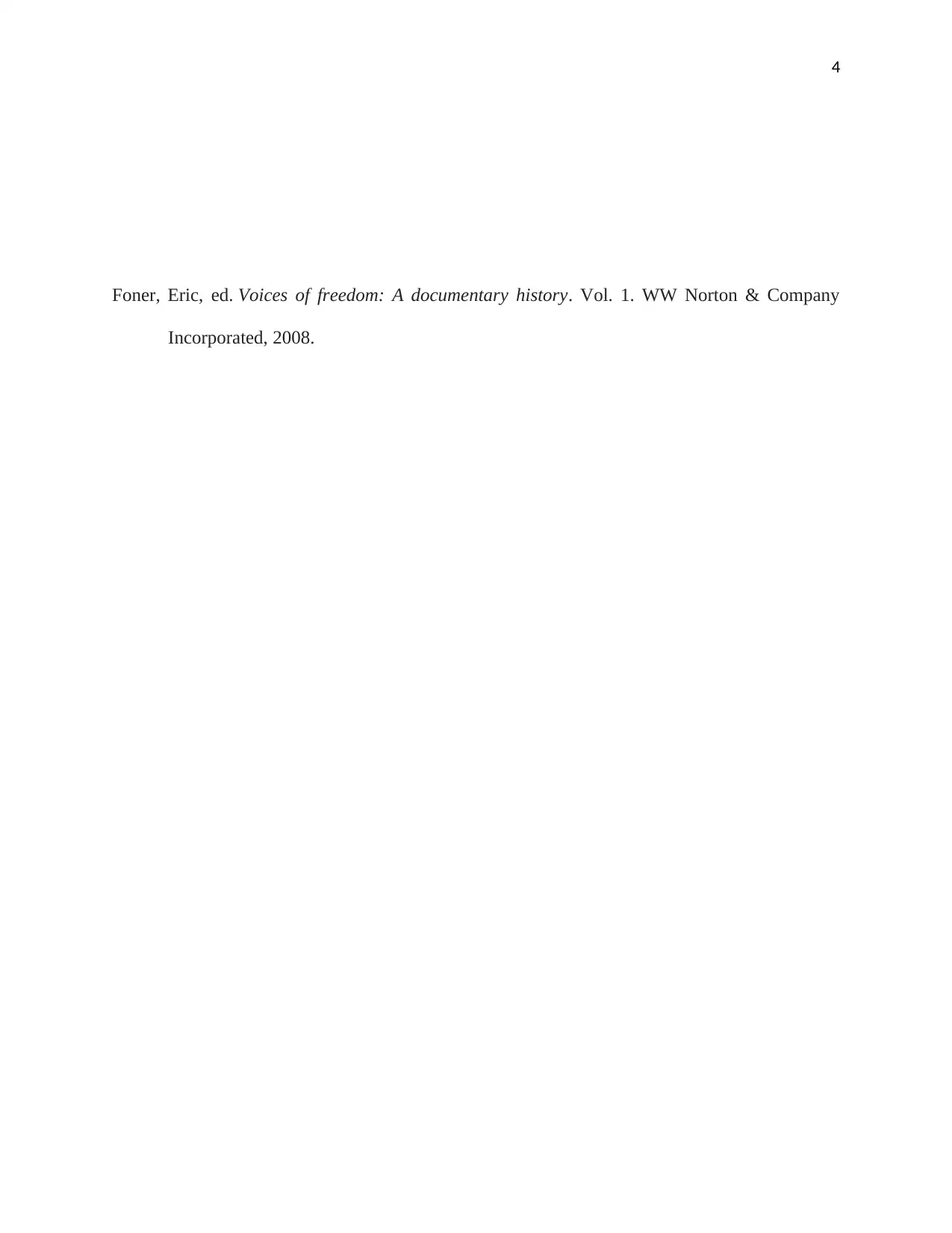Exploring the Civil War's Impact on Freedom: A Historical Analysis
VerifiedAdded on 2022/10/06
|5
|998
|17
Essay
AI Summary
This essay examines the Civil War and its impact on the concept of a "new birth of freedom," particularly for African Americans. It explores the historical context, the clash between abolitionists and slave owners, and the Emancipation Proclamation. The essay analyzes Lincoln's Gettysburg Address, highlighting his vision for freedom and the challenges faced by African Americans during Reconstruction. It discusses the shift in perspective from preserving the Union to embracing the principles of freedom. The essay also addresses the hypocrisy of the South and the lingering effects of racism in contemporary society, arguing for the continued need for equality and freedom for African Americans. The author uses Eric Foner's "Voices of Freedom" to support the arguments and provides an in-depth analysis of the Civil War's complex legacy.

IN WHAT WAYS DID THE CIVIL WAR REPRESENT A "NEW BIRTH OF FREEDOM"?
Name
Institution
Name
Institution
Paraphrase This Document
Need a fresh take? Get an instant paraphrase of this document with our AI Paraphraser

1
IN WHAT WAYS DID THE CIVIL WAR REPRESENT A "NEW BIRTH OF FREEDOM"?
Franklin Arethra once sang “freedom find out what it means to me!” Though not same
phrases, however, her demand for respect arose from an aspiration for freedom and autonomous.
Over a 100 years before releasing her “respect” recording United States stood wrangling the
Civil War and quiz of what really freedom implied and who merited freedom and autonomy on
vanguard of minds of everybody. The buildup towards the Civil War stood the every rising clash
between Southern slave owners and the Northern abolitionists (Foner 89). The Southern
indicated had already separated from United States thereby establishing America Confederate
States. They held that their secession could permit them to effectively preserve their rights of
owning slaves. The subsequent wrangle that followed stood a Civil War which resulted in
several fatalities for either South or North. Civil War further resulted in several attitudes
changing to the autonomy and liberty, precisely African-Americans’ freedom (Foner 91).
On other hand, the South stayed strong in pro-slavery position, the North saw African-
Americans in a novel light, whereby they stood considered associates merged together in
contradiction of their shared adversary of South. In the course of the Civil War, there stood a
“new birth of freedom” in North which already instigated with Emancipation Proclamation,
however, stood eventually extinguished out as turned out to be obvious that African-Americans
might never be given the essential mechanisms to back individually as United States’ citizens,
but instead they might be anticipated to recommence their respective responsibilities as the hard
workers of nation.
Before converting to US, Americans already battled for self-determination from Great
Britain. During this time, the colonialist held that they merited such rights to liberty, life as well
as search of delight. Whereas such colonizers stood wrangling to accomplish own autonomy,
IN WHAT WAYS DID THE CIVIL WAR REPRESENT A "NEW BIRTH OF FREEDOM"?
Franklin Arethra once sang “freedom find out what it means to me!” Though not same
phrases, however, her demand for respect arose from an aspiration for freedom and autonomous.
Over a 100 years before releasing her “respect” recording United States stood wrangling the
Civil War and quiz of what really freedom implied and who merited freedom and autonomy on
vanguard of minds of everybody. The buildup towards the Civil War stood the every rising clash
between Southern slave owners and the Northern abolitionists (Foner 89). The Southern
indicated had already separated from United States thereby establishing America Confederate
States. They held that their secession could permit them to effectively preserve their rights of
owning slaves. The subsequent wrangle that followed stood a Civil War which resulted in
several fatalities for either South or North. Civil War further resulted in several attitudes
changing to the autonomy and liberty, precisely African-Americans’ freedom (Foner 91).
On other hand, the South stayed strong in pro-slavery position, the North saw African-
Americans in a novel light, whereby they stood considered associates merged together in
contradiction of their shared adversary of South. In the course of the Civil War, there stood a
“new birth of freedom” in North which already instigated with Emancipation Proclamation,
however, stood eventually extinguished out as turned out to be obvious that African-Americans
might never be given the essential mechanisms to back individually as United States’ citizens,
but instead they might be anticipated to recommence their respective responsibilities as the hard
workers of nation.
Before converting to US, Americans already battled for self-determination from Great
Britain. During this time, the colonialist held that they merited such rights to liberty, life as well
as search of delight. Whereas such colonizers stood wrangling to accomplish own autonomy,

2
they possessed slaves. This stood an apparent illogicality since the colonialists stood outraged
over injustices being deprived of their rights and hitherto they lacked any misgivings handling
slaves with identical injustices. As the United States contended with apparent double standards
for liberties, Civil War emerged, underlining the Northern abolitionist and Southern racist
sentimentalities. Midway via Civil War, following the Gettysburg Battle, Lincoln subsequently
provided his Gettysburg Address. In his address, Lincoln demanded for a “new birth of freedom”
in reference to the rights of African-Americans and their respective liberties from slavery.
Freedom, to African-Americans implied not solely being free from captivities, but further
their ability to sustain themselves as well as become autonomous from the external control
(Foner 88). Thus, President Johnson misleadingly made such an assertion in his address to
Congress following his rejection of a scheme by Radical Republicans which might have
provided freed slaves their voting rights. Johnson stated that forcing the suffering right out of the
white individuals’ hands and into Negroes’ hands remains a capricious breach of this very
principle.” To him, and the previous owners of slaves, a “new birth of freedom” prospect stood
observed as a threat to the supremacy of the whites as well as the encroachment of the whites’
rights. This is because they remained exceedingly afraid of the “Negro rule.”
Civil War reasoning had since altered as the fight progressed. Initially, major
determination stood the preservation of Union, as showcased in the Letter by Lincoln to Horace
Greeley stating that his supreme object in the fight was saving Union, rather than destroying or
saving slavery. This perspective subsequently extended to encompass the principles from “new
birth of freedom” which leaped from Northerners, alongside African-American’s common
adversary of South (Foner 92). Such remains demonstrated in Union songs sang in course of
they possessed slaves. This stood an apparent illogicality since the colonialists stood outraged
over injustices being deprived of their rights and hitherto they lacked any misgivings handling
slaves with identical injustices. As the United States contended with apparent double standards
for liberties, Civil War emerged, underlining the Northern abolitionist and Southern racist
sentimentalities. Midway via Civil War, following the Gettysburg Battle, Lincoln subsequently
provided his Gettysburg Address. In his address, Lincoln demanded for a “new birth of freedom”
in reference to the rights of African-Americans and their respective liberties from slavery.
Freedom, to African-Americans implied not solely being free from captivities, but further
their ability to sustain themselves as well as become autonomous from the external control
(Foner 88). Thus, President Johnson misleadingly made such an assertion in his address to
Congress following his rejection of a scheme by Radical Republicans which might have
provided freed slaves their voting rights. Johnson stated that forcing the suffering right out of the
white individuals’ hands and into Negroes’ hands remains a capricious breach of this very
principle.” To him, and the previous owners of slaves, a “new birth of freedom” prospect stood
observed as a threat to the supremacy of the whites as well as the encroachment of the whites’
rights. This is because they remained exceedingly afraid of the “Negro rule.”
Civil War reasoning had since altered as the fight progressed. Initially, major
determination stood the preservation of Union, as showcased in the Letter by Lincoln to Horace
Greeley stating that his supreme object in the fight was saving Union, rather than destroying or
saving slavery. This perspective subsequently extended to encompass the principles from “new
birth of freedom” which leaped from Northerners, alongside African-American’s common
adversary of South (Foner 92). Such remains demonstrated in Union songs sang in course of
⊘ This is a preview!⊘
Do you want full access?
Subscribe today to unlock all pages.

Trusted by 1+ million students worldwide

3
Civil War whereby the Northerners, in their song “Black Tom” sang that their Union crew would
still safeguard them and that African-Americans should never remain slaves.
Such an emphasis on ending slave stood further obvious in the 2nd Inaugural Speech by
Lincoln whereby he stated that it might appear strange any man should dare asking a fair God’s
help in sopping their meals from other men faces’ perspiration, yet let people judge not, that they
be not judged. This was where Lincoln highlighted the Southerners’ hypocrisy for possessing
slaves, but he never condemned them straightforwardly by his last words which showcased that
he had profoundly replicated on the matters slaveries and struggled to stay diplomatic whereas
delicately encouraging the South to provide slaves their individual accord by utilizing guilt-
tripping strategy like attractive to their moralities (Foner 90).
The Southerners lost Civil War thereby surrendering to North. In the course of Civil War,
there stood a prospective for Lincoln’s demand for a “new birth of freedom” to be actualized, yet
after the end of Civil War alongside Reconstruction starting, previous slaves stood never
genuinely accorded autonomy. Such a failed “new birth of freedom” remains manifested in the
society of the US today. This is because racism remains a big factor in daily lives from prejudice
on both levels of individual and government. African Americans warranted much better and it is
high time they are given freedom.
Civil War whereby the Northerners, in their song “Black Tom” sang that their Union crew would
still safeguard them and that African-Americans should never remain slaves.
Such an emphasis on ending slave stood further obvious in the 2nd Inaugural Speech by
Lincoln whereby he stated that it might appear strange any man should dare asking a fair God’s
help in sopping their meals from other men faces’ perspiration, yet let people judge not, that they
be not judged. This was where Lincoln highlighted the Southerners’ hypocrisy for possessing
slaves, but he never condemned them straightforwardly by his last words which showcased that
he had profoundly replicated on the matters slaveries and struggled to stay diplomatic whereas
delicately encouraging the South to provide slaves their individual accord by utilizing guilt-
tripping strategy like attractive to their moralities (Foner 90).
The Southerners lost Civil War thereby surrendering to North. In the course of Civil War,
there stood a prospective for Lincoln’s demand for a “new birth of freedom” to be actualized, yet
after the end of Civil War alongside Reconstruction starting, previous slaves stood never
genuinely accorded autonomy. Such a failed “new birth of freedom” remains manifested in the
society of the US today. This is because racism remains a big factor in daily lives from prejudice
on both levels of individual and government. African Americans warranted much better and it is
high time they are given freedom.
Paraphrase This Document
Need a fresh take? Get an instant paraphrase of this document with our AI Paraphraser

4
Foner, Eric, ed. Voices of freedom: A documentary history. Vol. 1. WW Norton & Company
Incorporated, 2008.
Foner, Eric, ed. Voices of freedom: A documentary history. Vol. 1. WW Norton & Company
Incorporated, 2008.
1 out of 5
Related Documents
Your All-in-One AI-Powered Toolkit for Academic Success.
+13062052269
info@desklib.com
Available 24*7 on WhatsApp / Email
![[object Object]](/_next/static/media/star-bottom.7253800d.svg)
Unlock your academic potential
Copyright © 2020–2026 A2Z Services. All Rights Reserved. Developed and managed by ZUCOL.




